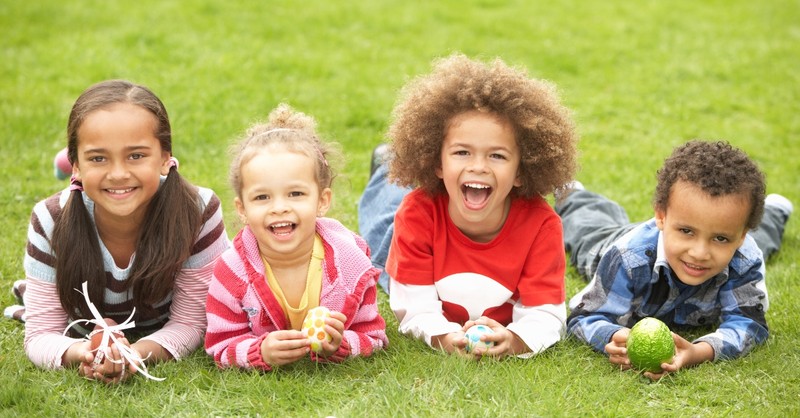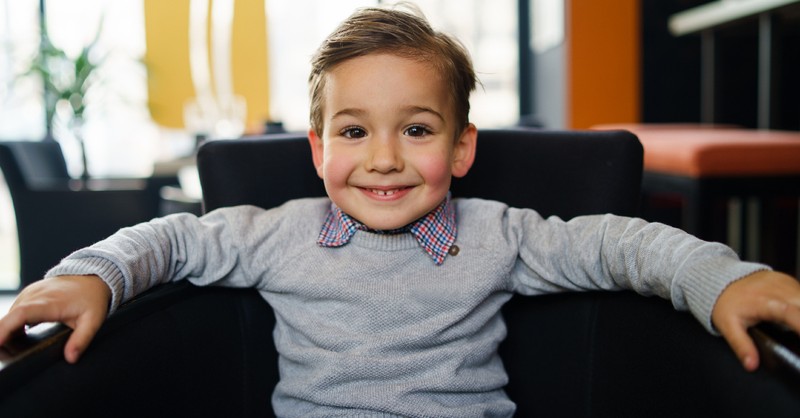Parenting Your Strong-Willed Child
http://www.ahaparenting.com/parenting-tools/positive-discipline/Parenting-Strong-Willed-Child
Have a strong-willed child? You're lucky! Strong willed children can be a challenge when they’re young, but if sensitively parented, they become terrific teens and young adults. Self-motivated and inner-directed, they go after what they want and are almost impervious to peer pressure. As long as parents resist the impulse to "break their will," strong-willed kids often become leaders.
What exactly is a strong-willed child? Some parents call them "difficult" or “stubborn,” but we could also see strong-willed kids as people of integrity who aren’t easily swayed from their own viewpoints. Strong-willed kids are spirited and courageous. They want to learn things for themselves rather than accepting what others say, so they test the limits over and over. They want desperately to be "in charge" of themselves, and will sometimes put their desire to "be right" above everything else. When their heart is set on something, their brains seem to have a hard time switching gears. Strong-willed kids have big, passionate feelings and live at full throttle.
Often, strong-willed kids are prone to power-struggles with their parents. However, it takes two to have a power struggle. You don't have to attend every argument to which you're invited! If you can take a deep breath when your buttons get pushed, and remind yourself that you can let your child save face and still get what you want, you can learn to sidestep those power struggles. (Don't let your four year old make you act like a four year old yourself!)
No one likes being told what to do, but strong-willed kids find it unbearable. Parents can avoid power struggles by helping the child feel understood even as the parent sets limits. Try empathizing, giving choices, and understanding that respect goes both ways. Looking for win/win solutions rather than just laying down the law keeps strong-willed children from becoming explosive and teaches them essential skills of negotiation and compromise.
Strong-willed kids aren't just being difficult. They feel their integrity is compromised if they're forced to submit to another person's will. If they're allowed to choose, they love to cooperate. If this bothers you because you think obedience is an important quality, I'd ask you to reconsider. Of course you want to raise a responsible, considerate, cooperative child who does the right thing, even when it's hard. But that doesn't imply obedience. That implies doing the right thing because you want to. Morality is doing what's right, no matter what you're told. Obedience is doing what you're told, no matter what's right.
So of course you want your child to do what you say. But not because he's obedient, meaning that he always does what someone bigger tells him to do. No, you want him to do what you say because he trusts YOU, because he's learned that even though you can't always say yes to what he wants, you have his best interests at heart. You want to raise a child who has self-discipline, takes responsibility, and is considerate -- and most important, has the discernment to figure out who to trust and when to be influenced by someone else.
Breaking a child's will leaves him open to the influence of others who often will not serve his highest interests. What's more, it's a betrayal of the spiritual contract we make as parents.
That said, strong-willed kids can be a handful -- high energy, challenging, persistent. How do we protect those fabulous qualities and encourage their cooperation?
Ten Tips for Positive Parenting
Your Strong-Willed, Spirited Child
1. Avoid power struggles by using routines and rules.
That way, you aren't the bad guy bossing them around, it’s just that:
"The rule is we use the potty after every meal and snack," or "The schedule is that lights-out is
at 8pm. If you hurry, we’ll have time for two books," or "In our house, we finish homework
before screen time."
2. Remember that strong-willed kids are experiential learners.
That means they have to see for themselves if the stove is hot. So unless you're worried about serious injury, it's more effective to let them learn through experience, instead of trying to control them. And you can expect your strong-willed child to test your limits repeatedly--that's how he learns. Once you know that, it's easier to stay calm, which avoids wear and tear on your relationship--and your nerves.
3. Your strong-willed child wants mastery more than anything.
Let her take charge of as many of her own activities as possible. Don’t nag at her to brush her teeth; ask “What else do you need to do before we leave?” If she looks blank, tick off the short list: “Every morning we eat, brush teeth, use the toilet, and pack the backpack. I saw you pack your backpack, that's terrific! Now, what do you still need to do before we leave?” Kids who feel more independent and in charge of themselves will have less need to be oppositional. Not to mention, they take responsibility early.
4. Give your strong-willed child choices.
If you give orders, he will almost certainly bristle. If you offer a choice, he feels like the master of his own destiny. Of course, only offer choices you can live with and don’t let yourself get resentful by handing away your power. If going to the store is non-negotiable and he wants to keep playing, an appropriate choice is:
"Do you want to leave now or in ten minutes? Okay, ten minutes with no fuss? Let's shake on it....And since it could be hard to stop playing in ten minutes, how can I help you then?"
5. Give her authority over her own body.
“I hear that you don’t want to wear your jacket today. I think it's cold and I am definitely
wearing a jacket. Of course, you are in charge of your own body, as long as you stay safe
and healthy, so you get to decide whether to wear a jacket. But I’m afraid that you will be
cold once we are outside, and I won’t want to come back to the house. How about I put your
jacket in the backpack, and then we’ll have it if you change your mind?”
She’s not going to get pneumonia, unless you push her into it by acting like you’ve won if she asks for the jacket. And once she won’t lose face by wearing her jacket, she’ll be begging for it once she gets cold. It’s just hard for her to imagine feeling cold when she’s so warm right now in the house, and a jacket seems like such a hassle. She's sure she's right -- her own body is telling her so -- so naturally she resists you. You don't want to undermine that self-confidence, just teach her that there's no shame in letting new information change her mind.
6. Don't push him into opposing you.
Force always creates "push-back" -- with humans of all ages. If you take a hard and fast position, you can easily push your child into defying you, just to prove a point. You'll know when it's a power struggle and you're invested in winning. Just stop, take a breath, and remind yourself that winning a battle with your child always sets you up to lose what’s most important: the relationship. When in doubt say "Ok, you can decide this for yourself." If he can't, then say what part of it he can decide, or find another way for him to meet his need for autonomy without compromising his health or safety.
7. Side-step power struggles by letting your child save face.
You don’t have to prove you’re right. You can, and should, set reasonable expectations and enforce them. But under no circumstances should you try to break your child’s will or force him to acquiesce to your views. He has to do what you want, but he's allowed to have his own opinions and feelings about it.
8. Listen to her.
You, as the adult, might reasonably presume you know best. But your strong-willed child has a strong will partly as a result of her integrity. She has a viewpoint that is making her hold fast to her position, and she is trying to protect something that seems important to her. Only by listening calmly to her and reflecting her words will you come to understand what’s making her oppose you. A non-judgmental “I hear that you don’t want to take a bath. Can you tell me more about why?” might just elicit the information that she’s afraid she’ll go down the drain, like Alice in the song. It may not seem like a good reason to you, but she has a reason. And you won’t find it out if you get into a clash and order her into the tub.
9. See it from his point of view.
For instance, he may be angry because you promised to wash his superman cape and then forgot. To you, he is being stubborn. To him, he is justifiably upset, and you are being hypocritical, because he is not allowed to break his promises to you, but you broke yours to him. How do you clear this up and move on? You apologize profusely for breaking your promise, you reassure him that you try very hard to keep your promises, and you go, together, to wash the cape. You might even teach him how to wash his own clothes so you're not in this position in the future and he's empowered. Just consider how would you want to be treated, and treat him accordingly.
10. Discipline through the relationship, never through punishment.
Kids don’t learn when they’re in the middle of a fight. Like all of us, that’s when adrenaline is pumping and learning shuts off. Kids behave because they want to please us. The more you fight with and punish your child, the more you undermine her desire to please you. If she's upset, help her express her hurt, fear or disappointment, so they evaporate. Then she'll be ready to listen to you when you remind her that in your house, everyone speaks kindly to each other. (Of course, you have to model that. Your child won't always do what you say, but she will always, eventually, do what you do.)
11. Offer him respect and empathy.
Most strong-willed children are fighting for respect. If you offer it to them, they don’t need to fight to protect their position. And, like the rest of us, it helps a lot if they feel understood. If you see his point of view and think he's wrong -- for instance, he wants to wear the superman cape to church and you think that's inappropriate -- you can still offer him empathy and meet him part way while you set the limit.
"You love this cape and wish you could wear it, don't you? But when we go to services we
dress up to sow respect, so we can't wear the cape. I know you'll miss wearing it. How
about we take it with us so you can wear it on our way home?"
Does this sound like Permissive Parenting? It isn't. You set limits. There's just never any reason to be mean about it!
Need more ideas about












